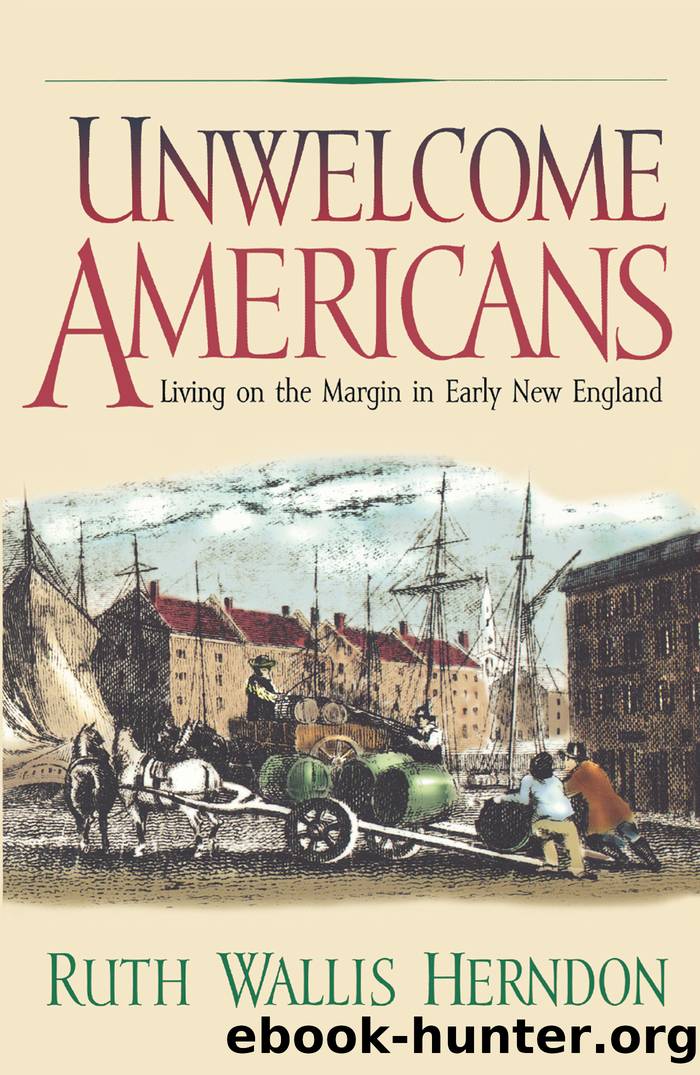Unwelcome Americans by Herndon Ruth Wallis;

Author:Herndon, Ruth Wallis;
Language: eng
Format: epub
Publisher: University of Pennsylvania Press
Published: 2019-08-15T00:00:00+00:00
4. Reversal of Fortune
WHEN IN 1764 John Bennett asked the Warwick town council to assist him in the construction of a house for his family, he pleaded that he âhas the misfortune to be a very poor man.â Many of the transients in this study could have said the same thing, for economic hard times, especially in the 1780s, made life even more difficult for people already struggling to get by. As if poverty were not sufficient misfortune, some transients were propelled into disaster by particular catastrophes. The narratives in this section illuminate the variety of misfortunes that complicated the state of poverty in which many transients existed.
Some catastrophes touched everyone in the community. Two wars dominated the political history of the latter part of the eighteenth century in Anglo-America: the Seven Yearsâ War (1756â63) and the American Revolution (1776â83). In both eras, women and children became transients when they tried to follow or rejoin soldier fathers and husbands, and men became transients when they tried to pursue a livelihood in a new place where their army experience had brought them. In the Revolutionary War, transients were made by the three-year (1776â79) British occupation of Rhode Island towns on islands in Narragansett Bay (Newport, Jamestown, Middletown, and Portsmouth) and New Shoreham, on Block Island in Long Island Sound. Many of the residents in those towns fled to mainland towns to wait out the occupation, and the state legislature ordered mainland towns to shelter and support the arriving refugees (host towns would later be reimbursed from the state treasury). Some of those refugees preferred to stay in their host towns and did not return to their battle-scarred homes after the war was over. When they fell on hard times and needed assistance in the 1780s and 1790s, their host towns usually tried to send them back to their hometowns. Thus war was responsible for the dislocation of numerous transients, including Jerusha Townsend (Chapter 1), Judah Hazard Wanton (Chapter 2), Phillis Merritt Wanton (Chapter 3), and Benjamin Jones (this chapter).
Epidemic disease was another community catastrophe that visited southeastern New England regularly in the eighteenth century. Infectious disease made transients out of some people by causing death and disability in families and galvanized survivors into leaving their hometowns in search of another job, better fortune, or the support of relatives and friends. It also rendered resident transients highly visible to the official eye of town leaders, who were responsible for organizing community efforts to contain such diseases. In the atmosphere of worry and panic that gripped affected communities, transients could easily appear a threat to the town, and they could become handy scapegoats, charged with bringing a disease into the community or causing its spread by their poor and unhealthful living arrangements. Further, those transient residents who actually contracted the disease could expect to be forcibly removed to their home communities as soon as they were well enough to withstand the journey. An outbreak of infectious disease was good cause for all transients to worry about their future in a community.
Download
This site does not store any files on its server. We only index and link to content provided by other sites. Please contact the content providers to delete copyright contents if any and email us, we'll remove relevant links or contents immediately.
| Americas | African Americans |
| Civil War | Colonial Period |
| Immigrants | Revolution & Founding |
| State & Local |
In Cold Blood by Truman Capote(3149)
Steve Jobs by Walter Isaacson(2770)
The Innovators: How a Group of Hackers, Geniuses, and Geeks Created the Digital Revolution by Walter Isaacson(2553)
All the President's Men by Carl Bernstein & Bob Woodward(2274)
Lonely Planet New York City by Lonely Planet(2120)
The Room Where It Happened by John Bolton;(2042)
And the Band Played On by Randy Shilts(2025)
The Poisoner's Handbook by Deborah Blum(1998)
The Murder of Marilyn Monroe by Jay Margolis(1992)
The Innovators by Walter Isaacson(1985)
Lincoln by David Herbert Donald(1884)
A Colony in a Nation by Chris Hayes(1804)
Under the Banner of Heaven: A Story of Violent Faith by Jon Krakauer(1693)
Amelia Earhart by Doris L. Rich(1593)
The Unsettlers by Mark Sundeen(1591)
Birdmen by Lawrence Goldstone(1543)
Dirt by Bill Buford(1535)
Zeitoun by Dave Eggers(1527)
Decision Points by George W. Bush(1469)
